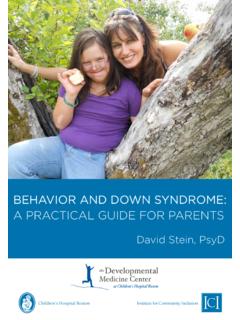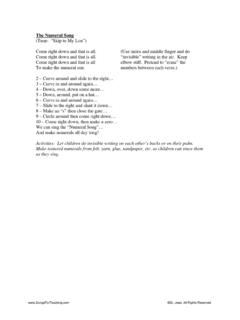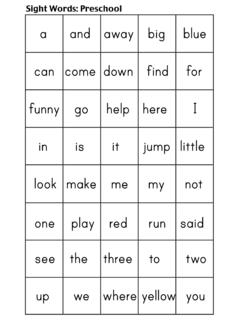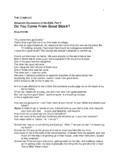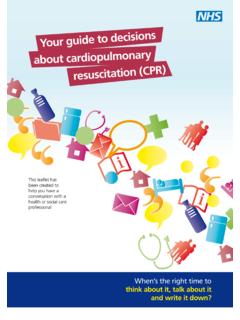Transcription of Behavior and down Syndrome: A PrActicAl Guide for PArents
1 Behavior and down Syndrome: A PrActicAl Guide for PArentsdavid stein, PsydInstitute for Community InclusionChildren s Hospital BostonParenting can be a bit like setting off on a journey without a map. with each unexpected fork in the road, the caring parent uses intuition informed by prior experiences to choose a path. For some families, this works out just fine. For most of us, a little extra guidance to understanding our children s Behavior can make a huge difference. while there are several very good books that address general child Behavior , there is not much information available for families specifically designed to support positive Behavior for children with down syndrome.
2 Dr. Stein s Guide fills this gap beautifully providing sound, PrActicAl advice for PArents of children with down syndrome. recognizing that each child is unique but also that there are some common areas that can present challenges and also particular strategies that have proven successful, dr. Stein gives advice that you can start using today. i am so pleased to recommend this Guide to the families who come to the down Syndrome Program at Children s hospital. i hope you find it sheds light on the road ahead for a more peaceful and fulfilling journey for your Jean Davidson, MD, MPHD irector, down Syndrome ProgramDevelopmental Medicine CenterChildren s Hospital BostonThe down Syndrome Program at Children s hospital Boston offers specialized services for children with down syndrome and their families.
3 Program staff work closely with children, PArents , medical specialists, community physicians, and educators. The program is a subspecialty service of the developmental medicine Center at Children s hospital more information or support, please call 857-218-4329 or visit our website at 2011 Children s hospital use of information in this brochure should be accompanied by an acknowledgment of Children s hospital Boston as the source, citing the name of the brochure and the author. reproduction or translation of this brochure requires explicit, prior authorization in does my child With down syndrome have Behavior problems?
4 Behavior problems are very common in aLL children. 1 in 10 children has Behavior problems that are serious enough to be diagnosed by a problems are even more common in children with down syndrome. 1 in 3 children with down syndrome has Behavior problems that are serious enough to be diagnosed by a professional. even more children with down syndrome have Behavior problems that might not be diagnosed, but still cause problems for kids and their families. some reasons that kids With down syndrome often have Behavior problems:trouble controlling impulsesChildren with down syndrome often don t notice the stop signs that tell them not to behave in certain ways.
5 Trouble communicatingwhen people cannot express themselves or understand others easily, they become frustrated. Children with down syndrome often have this difficulty. trouble relating to other children and adultsmany children with down syndrome are social and affectionate. But often, they may not know how to play efficiently with peers. This can be very upsetting to the child with down syndrome, and can cause misbehavior. trouble managing frustrationwe ve already established that children with down syndrome have reason to be frustrated.
6 Unfortunately, many also struggle to calm down and feel better when frustrations come up. This can worsen Behavior problems. style of parenting didn t cause these problemsBut you can make a big difference by making some changes. That s how this brochure can help you!keep doing What WorksParenting is a hard job. you are probably already going many things very well as a parent. Some of the tools in this pamphlet may help you do even better! Behavior and down Syndrome: A PrActicAl Guide for PArents be consistent Behaviors can change quickly; the hard part is changing behaviors for the long-term.
7 That s why setting up a realistic plan is important. we ll give you some ways to do that in this brochure. keep your eye on the long-term goalsmaking some changes now can make a big difference in your child s future ( , level of independent living, ability to work, etc.), even you don t see dramatic improvements right away. remembering the big picture can help you get through daily frustrations. Behavior is a Way of communicatinga child s Behavior even really difficult Behavior can tell us that she doesn t have a skill that she needs, that she is frustrated, that she is physically uncomfortable, or countless other important messages.
8 Remembering that your child is trying to communicate something can make it easier to deal with difficult ideas, neW approachUse the same approach you would with another child and modify it. many of the same behavioral techniques that work with most children are also effective for kids with down syndrome. you just have to learn to use them in a way that fits your child. you are not aloneyour child s healthcare providers, school system, and community resources are available to give you information, services, and support.
9 This Guide is designed to help you use proven behavioral techniques, with the unique needs of children with down syndrome in mind. These techniques can help improve your child s Behavior . Some are ideas you might feel comfortable trying out on your own. For others, you might ask for help from a Who can helppediatrician your pediatrician can speak with you about Behavior problems, and can help to rule out medical causes, such as poor sleep. your pediatrician can also refer you to a mental health professional such as a psychologist, psychiatrist, or social worker.
10 A consultation with a professional will allow you to understand your child s specific needs and how best to intervene. This might include looking at factors that affect your child s Behavior , such as communication style, cognitive skills, academics, classroom setting, and social and emotional well-being. school Today s laws state that an education must address all areas of a child s development. if Behavior is a problem, it is reasonable to ask the school for some help. you might ask the school to conduct an assessment of your child s Behavior .

